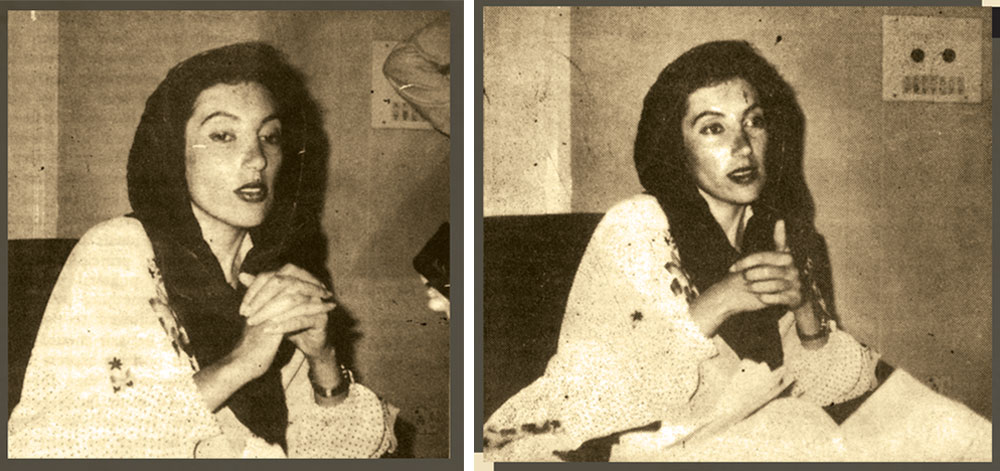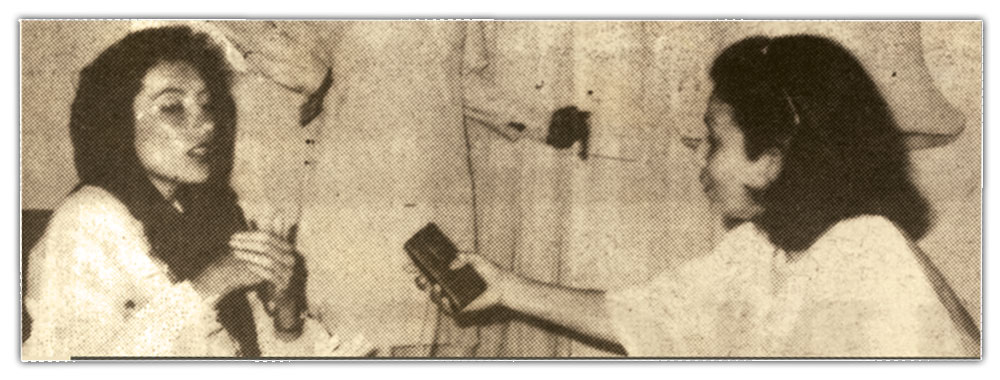Painting Images
- 03 Feb - 09 Feb, 2018

High-spirited and determined to face new challenges, Miss Benazir Bhutto called the events and the flaws of her party which led to the execution of her father, the founding Chairman of the Pakistan People’s Party late Zulfikar Ali Bhutto, the structure of the party had collapsed. During an exclusive interview with MAG, Miss Benazir Bhutto replied to the questions relating to general political situation in the country, her party, her attitude towards the senior members of the PPP and to the popular support she received on her arrival in Pakistan.
Your party stands for multi-class system. Somehow or the other it is our impression that your father’s downfall was also due to the fact that he wanted to carry both the right and left wing forces along. But during the 1977 agitation both ultra-rightists and ultra-leftists opposed the PPP. And now you have adopted the same policy of retaining both the leftists and the rightists. Can you get along these factions? Or how long these classes are going to remain with you?
That is a very interesting question. Needs a long debate. But briefly, let me explain to you that failure was not with the multi-class system. The failure lay with the party being too new, too fresh. Political power came too soon to too many individuals. Those individuals did not recognise what political power meant. Each member who became an MNA wanted to be a minister. Each one who became a minister wanted to be a chief minister. Everyone who was the chief minister wanted to be a governor who then wanted to become the prime minister. There were intrigues and intrigues and more intrigues. There was no selfless devotion. The prime minister was forced to carry the government alone on his shoulders.
There was collapse of party structure. The different groups in the party were more interested in trying to make their bids for successions than their bids to implement the policies of the government.
I have realised that at that time, mistakes had been committed by ambitious members of the party. That’s why I have tried to re-organise the party on different lines. I want to build a team which will not have lust for power and posts or offices. A team of selfless committed workers. During the last nine years, we have seen the emergence of a real cadre. Emergence of selfless party members who are devoted to the cause and not interested in offices; you can judge their devotion through their countless sacrifices by facing floggings, jails, and executions. Our workers kissed the gallows. If the people can kiss the gallows and put the rope around their necks that is the height of conviction. I look towards these people. I do not want to have a party of paper-tigers. Still I maintain the PPP is not the party of scientific socialists or right wingers. We will remain a multi-class party. Nothing was wrong with the multi-class system but the wrong was done by the opportunists. It would not be the same PPP now. This is the PPP which went through fire and hell.

You have been through crisis after crisis ever since you took over the command of your party. What are your present difficulties and how are you going to surmount them?
There is no crisis inside the party and there has never been. The party has always been very strong and unified. In fact I am proud of our party workers. I do not think there is any other country in the world which has such a wide base of political organisation as we have had or put up such a heroic resistance against the Martial Law as we have. A deliberate psychological warfare was waged against our party to try and break the spirit of the workers. It was said that we were disorganised but we were never disorganised. We were most organised. You can see the strength and intensity of our organisation when in Poland they lifted the Martial Law after a year or so, in Turkey in a year or so, in Bangladesh a year or so, but in Pakistan they could not lift Martial Law in nine years. This was because of the organisational strength and courage of the PPP workers. Of course certain individuals may fail and the failure of those individuals is not the failure of the organisation or the masses. I would say that during the last nine years such dedication and conviction was shown which led to the real failure of the Martial Law regime. Of course outside the party we have been facing repression, torture and the most cruel and inhuman treatment in 5000 years of history of the areas which comprise Pakistan. Never has there been such persecution together with dishonour and terror.
Coming to the present day, how would you describe your most pressing problems outside the party?
Well, I think what I have just said is part of that pressing problem. The most important problems that are there are not problems that face me. There are problems that face the country. There are problems that face the people. And in that they are providing to strengthen the foundation of the state. I feel a sense of participation in giving people a lead. Secondly, as far as the underprivileged are concerned there has been a conscious policy to persecute them, because a regime based on terror survives on terror. A regime based on persecution survives on persecution. I feel that there are two fold tasks where democracy is concerned. One to vitalise and strengthen the foundations of the state and two, to vitalise and give the rights to the poor people.
How is it to be in politics? As you have said in one of your recent interviews that politics was never your cup of tea. Do you think it is the result of your own courage, the charisma of your late father or the anti-Zia feeling?
Of course I grew up in a political atmosphere. I come from a political family so I have always seen the dangers that are attributed with following political beliefs in a country like Pakistan. That is why I had thought it would have been safer for me to join the foreign service. My induction into politics came because of a vacuum that existed. The party workers looked towards me and I could not fail them. And if I am in the field it is because of a sense of responsibility to all those who have suffered. A sense of responsibility towards my country so I cannot say I am reluctant in performing my duty.
[Last part of the interview to be concluded next week.]
COMMENTS